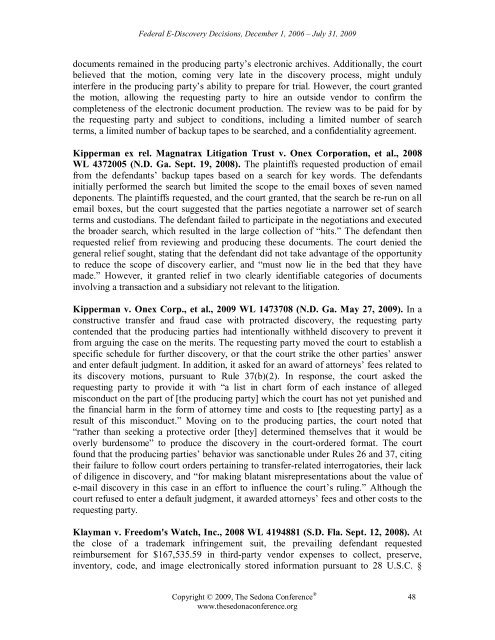Federal Court Decisions Involving Electronic Discovery, December 1 ...
Federal Court Decisions Involving Electronic Discovery, December 1 ...
Federal Court Decisions Involving Electronic Discovery, December 1 ...
You also want an ePaper? Increase the reach of your titles
YUMPU automatically turns print PDFs into web optimized ePapers that Google loves.
<strong>Federal</strong> E-<strong>Discovery</strong> <strong>Decisions</strong>, <strong>December</strong> 1, 2006 – July 31, 2009<br />
documents remained in the producing party’s electronic archives. Additionally, the court<br />
believed that the motion, coming very late in the discovery process, might unduly<br />
interfere in the producing party’s ability to prepare for trial. However, the court granted<br />
the motion, allowing the requesting party to hire an outside vendor to confirm the<br />
completeness of the electronic document production. The review was to be paid for by<br />
the requesting party and subject to conditions, including a limited number of search<br />
terms, a limited number of backup tapes to be searched, and a confidentiality agreement.<br />
Kipperman ex rel. Magnatrax Litigation Trust v. Onex Corporation, et al., 2008<br />
WL 4372005 (N.D. Ga. Sept. 19, 2008). The plaintiffs requested production of email<br />
from the defendants’ backup tapes based on a search for key words. The defendants<br />
initially performed the search but limited the scope to the email boxes of seven named<br />
deponents. The plaintiffs requested, and the court granted, that the search be re-run on all<br />
email boxes, but the court suggested that the parties negotiate a narrower set of search<br />
terms and custodians. The defendant failed to participate in the negotiations and executed<br />
the broader search, which resulted in the large collection of “hits.” The defendant then<br />
requested relief from reviewing and producing these documents. The court denied the<br />
general relief sought, stating that the defendant did not take advantage of the opportunity<br />
to reduce the scope of discovery earlier, and “must now lie in the bed that they have<br />
made.” However, it granted relief in two clearly identifiable categories of documents<br />
involving a transaction and a subsidiary not relevant to the litigation.<br />
Kipperman v. Onex Corp., et al., 2009 WL 1473708 (N.D. Ga. May 27, 2009). In a<br />
constructive transfer and fraud case with protracted discovery, the requesting party<br />
contended that the producing parties had intentionally withheld discovery to prevent it<br />
from arguing the case on the merits. The requesting party moved the court to establish a<br />
specific schedule for further discovery, or that the court strike the other parties’ answer<br />
and enter default judgment. In addition, it asked for an award of attorneys’ fees related to<br />
its discovery motions, pursuant to Rule 37(b)(2). In response, the court asked the<br />
requesting party to provide it with “a list in chart form of each instance of alleged<br />
misconduct on the part of [the producing party] which the court has not yet punished and<br />
the financial harm in the form of attorney time and costs to [the requesting party] as a<br />
result of this misconduct.” Moving on to the producing parties, the court noted that<br />
“rather than seeking a protective order [they] determined themselves that it would be<br />
overly burdensome” to produce the discovery in the court-ordered format. The court<br />
found that the producing parties’ behavior was sanctionable under Rules 26 and 37, citing<br />
their failure to follow court orders pertaining to transfer-related interrogatories, their lack<br />
of diligence in discovery, and “for making blatant misrepresentations about the value of<br />
e-mail discovery in this case in an effort to influence the court’s ruling.” Although the<br />
court refused to enter a default judgment, it awarded attorneys’ fees and other costs to the<br />
requesting party.<br />
Klayman v. Freedom's Watch, Inc., 2008 WL 4194881 (S.D. Fla. Sept. 12, 2008). At<br />
the close of a trademark infringement suit, the prevailing defendant requested<br />
reimbursement for $167,535.59 in third-party vendor expenses to collect, preserve,<br />
inventory, code, and image electronically stored information pursuant to 28 U.S.C. §<br />
Copyright © 2009, The Sedona Conference ® 48<br />
www.thesedonaconference.org
















